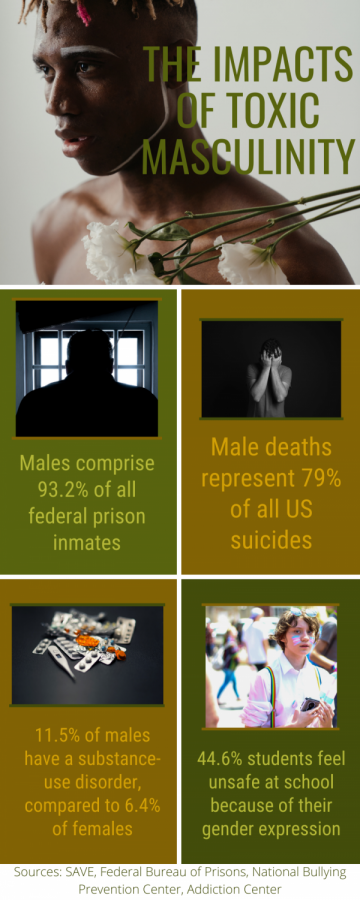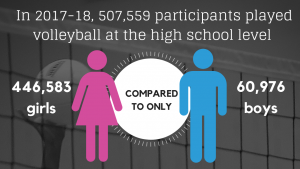Toxic masculinity reinforces harmful gender norms
Toxic masculinity harms both males and females by promoting unhealthy standards.
October 27, 2020
“Man up.”
“Men don’t cry.”
“Stop being such a girl.”
These phrases are often repeated to boys, and although they may seem insignificant, they actually have a widespread negative impact on society. They allow for bigotry and discrimination by shaping the way masculinity is perceived.
People who claim that toxic masculinity is nonexistent often fail to truly understand what it is; the issue is not masculinity itself, but society’s warped standard of what men should be like–a standard that ends up hurting all people.
According to The Good Men Project, toxic masculinity is a narrow and repressive description of manhood illustrated by violence, sex, status and aggression. The pressure put on boys to be a “real man” can stunt the development of their emotional intelligence and, as a result, cause severe mental issues.
“More often than not, guys are labeled as ‘gay’ or ‘weak’ for not displaying the masculine properties most guys supposedly have,” senior Jonathan Luu said. “As such, many guys become afraid to confront others, creating a mask for themselves as they often act ‘more masculine’ in front of others in order to prove their worth.”
Toxic masculinity is also revealed in the phrase “boys will be boys,” which is sometimes used to try to justify hurtful behavior. This excuse can drastically shape the mindset of young boys, as they are not encouraged to learn from their mistakes and own up to their actions. The “boys will be boys” mindset also implies that men are biologically aggressive and gives them the false understanding that it is okay for them to express their feelings physically, when really this behavior may be stemming from other sources, such as familial or financial issues.
In addition to allowing men to escape from receiving proper consequences, this mindset also makes it difficult for men to be taken seriously as victims. Even though one in six men will have experienced sexual violence in their lifetimes, according to NoMore, the idea that men cannot show weakness makes it difficult for victims to recover properly from their trauma.
Although it may seem difficult, breaking down toxic masculinity is possible. As with most issues, change begins with education. All classrooms, especially ones for younger students, should actively avoid setting gender norms so that no student feels pressured to conform to irrational stereotypes. This way, future generations will be more comfortable with differences in gender expression and break the cycle of toxic masculinity.
“A simple way to combat toxic masculinity is to educate everyone that it is okay to show emotion and be vulnerable,” senior Anina Jojo said. “In the long run, it is the only way to [maintain a] healthy [mindset].”
Confronting gender norms ingrained in contemporary society will take time and effort, but it must be done. Ignoring this issue will only create more injustice, fueling the stigma towards people who are different and dividing our country further. It is important to have conversations about how toxic masculinity affects everyone and share our experiences with gender expectations so that we can learn how to deconstruct these stereotypes.
“Although recently more guys have shied away from toxic masculinity, it is still a prominent problem which needs to be addressed,” Luu said. “People need to learn and accept the fact that every guy is different and should allow them to do what they are interested in instead of forcing them to do something they aren’t.”




